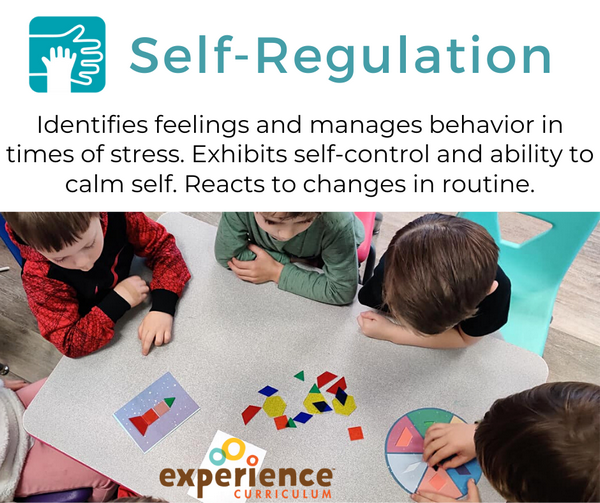What is Self-Regulation?
Self-regulation is a child’s ability to manage her emotions, behavior and body when faced with a difficult situation, problem or challenge. Self-regulation includes the ability to identify feelings, the ability to calm down after an exciting or upsetting incident and the ability to regulate reactions or emotions like frustration or excitement.

Why is Self-Regulation Important?
Children develop the foundational skills of self-regulation in the first five years of life, beginning with skills that include an infant sucking on his hand when startled or stressed in an effort to self-soothe or a toddler waiting for her turn to be served lunch. Self-regulation requires learning to cope with frustration or discomfort when a need is not met. “Infants are unable to regulate themselves.
Despite being born with the capacity for feeling deep emotions, babies are unable to keep themselves in a state of equilibrium, lacking the skills to regulate either the intensity or the duration of those emotions. Babies need assistance and monitoring of a responsive caregiver to maintain equilibrium and not become overwhelmed” Being responsive to a child’s communication of distress and meeting their needs in a timely manner is very important in developing early self-regulation.
Learning to self-regulate is a key milestone in early childhood development. A child who cannot self-regulate may find it difficult to make and maintain friendships and repeated tantrums will strain the parent-child relationship. The inability to self-regulate can snowball into traits such as anger, aggression, withdrawal or anxiety.
In contrast, good self-regulation encourages positive relationships and is a strong indicator of future academic success. Children who can self-regulate maintain better attention and problem-solving capabilities and perform better on tasks that involve long-term goals and delayed gratification. Achieving self-regulation will allow children to grow into functional adults who can manage their thoughts, emotions and behaviors.
How Do Children Learn Self-Regulation Skills Over Time?
A child demonstrates self-regulation by identifying feelings, managing behavior in times of stress, exhibiting self-control and calming himself. Self-regulation will look different at each phase of the developmental process:
Infants calm with support from the caregiver when upset and respond when their basic needs are taken care of.
Toddlers show a range of emotions with facial expressions and soothe themselves by seeking a familiar adult or thing. They identify when they have deviated from their typical routine.
Preschoolers recognize personal feelings, control impulses with reminders and–with support–negotiate ways to handle nonroutine transitions. For example, if they anticipate a change in routine, preschoolers will prepare themselves by finding a desired thing or person.
Primary schoolers identify and explain personal feelings and describe the appropriate response to their varying emotions. They will demonstrate an ability to swiftly transition from one activity to the next and help others through the transition. They begin to adapt quickly to new situations with minimal stress and apply strategies to adjust and calm themselves in new or stressful situations.
Our integrated curriculum system uniquely weaves 35 research-based skills into playful games and discovery projects. The cross-disciplinary model supports a child’s on-going social-emotional, physical, language and cognitive development. See what children learn through play and download the Developmental Continuum of Skills.